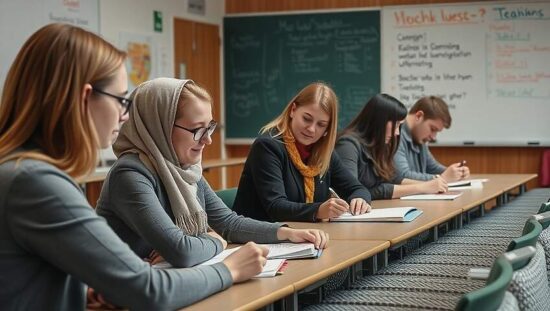In a bid to address the acute teacher shortage in Germany, an increasing number of individuals without a recognized teaching certification are being employed as teachers, commonly referred to as “Quer- und Seiteneinsteiger.” According to the Federal Statistical Office (Destatis), this trend is particularly evident in the 2023-2024 academic year, with 10.5% of teachers at general education schools, or approximately 77,600 of the total 739,500 teachers, lacking a recognized teaching certification.
Compared to the 2015-2016 academic year, when the proportion of such teachers was 4.5%, the trend has seen a significant increase. In the earlier period, around 29,900 of the total 667,400 teachers at general education schools did not have a recognized teaching certification.
The distinction between Quereinsteiger and Seiteneinsteiger lies in the fact that the former have undergone a teaching training program, whereas the latter have not. The statistics do not provide a separate breakdown of teachers without a recognized teaching certification by Quereinsteiger or Seiteneinsteiger.
Notably, the proportion of teachers without a recognized teaching certification is higher at vocational schools, with 16.6% of the total 123,800 teachers in the 2023-2024 academic year, a figure that has remained relatively stable over the years.
Despite the growing trend of employing teachers without a recognized teaching certification, the demand for trained teachers remains high. The number of graduates with a Master’s or state examination degree has shown a slight increase, with around 29,000 students passing the teaching certification exam in 2023, a 3% increase from the previous year.
Furthermore, the number of new students enrolling in teaching programs has also shown a slight increase, with approximately 46,400 individuals starting a teaching program in the 2023 academic year, a 2.4% increase from the previous year. However, this figure is still lower than it was ten years ago, a decline of 2.1%.





